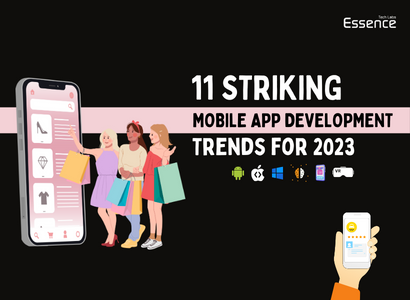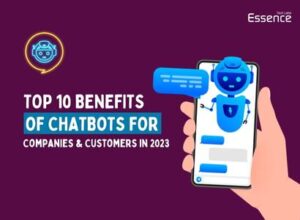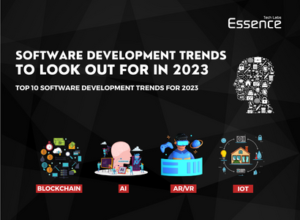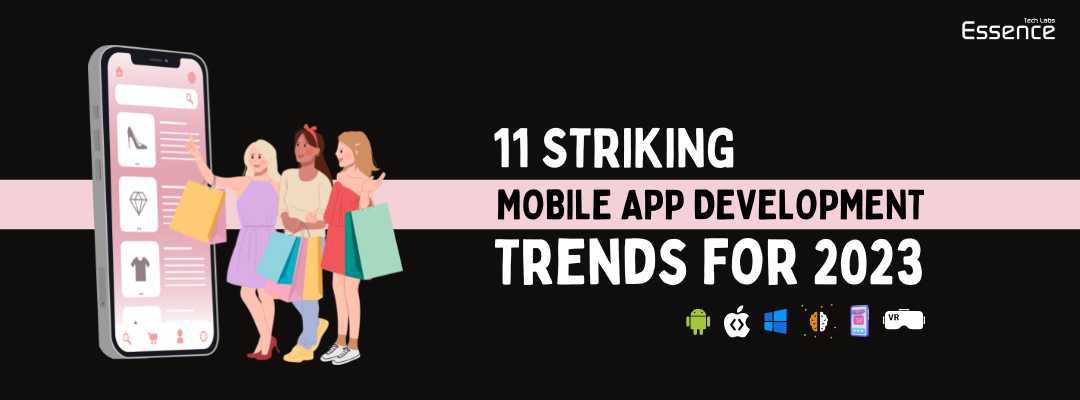
Top 11 Mobile App Development Trends for 2023
As we gear up for 2023, it’s exciting to think about what the future holds for mobile app development.
As technology continues to evolve at a rapid speed, we’re constantly seeing new trends appear that shape the way we design and interact with apps on our phones.
In this article, we’re going to take a closer look at 11 of the most striking mobile app development trends for 2023.
From advances in AI and machine learning to the rise of voice-based interfaces, these trends have the potential to change the way we use apps on a daily basis.
What is Mobile Development & its types?
Mobile development is the process of creating mobile applications that can run on smartphones, tablets, and other mobile devices. It involves designing, developing, testing, and deploying software applications for mobile platforms such as Android, iOS, or Windows. Mobile developers use various programming languages, development tools, and frameworks to create mobile apps that can provide different functionalities to users, such as games, social media, e-commerce, and more. Mobile development is a dynamic and growing field that is changing the way we interact with technology on a daily basis.
Types of Mobile Development:
- Native apps: This involves building mobile apps specifically for a single platform, such as iOS or Android, using the platform’s programming languages, tools, and software development kits (SDKs).
- Web apps: This involves building mobile web applications that run on mobile web browsers. Web apps can be accessed on any device with a web browser, and can be built using web technologies such as HTML, CSS, and JavaScript.
- Hybrid apps: This involves building mobile apps that combine elements of both native and web development.
Top 11 Mobile App Development Trends
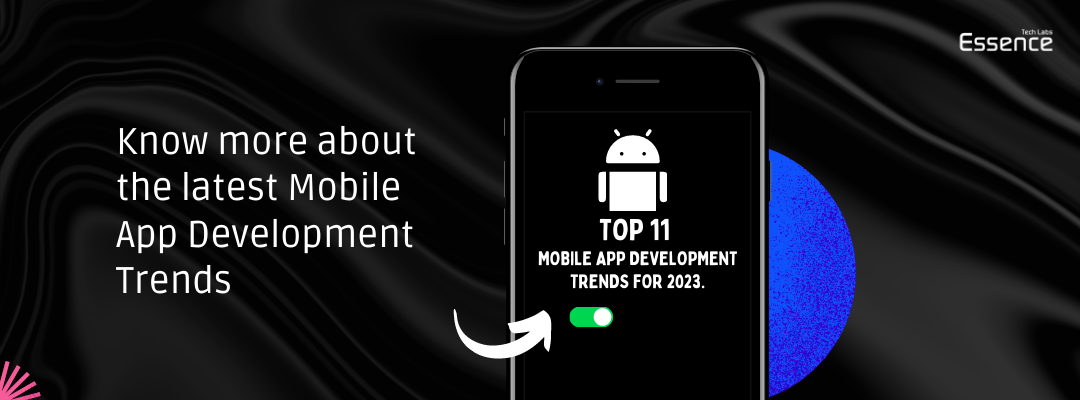
Following are the top 11 Mobile App Development Trends:
1. Extended Reality (XR) technologies for advanced experiences
In the mobile app space, XR technologies such as virtual reality (VR), augmented reality (AR), and mixed reality (MR) are becoming increasingly popular.
They enable developers to create highly immersive experiences capable of transporting users to new worlds, enhancing real-world experiences, and providing unique and engaging interactions. The ability of XR technologies to provide a more natural and intuitive user experience is one of their primary advantages.
For example, augmented reality (AR) can be used to create virtual shopping experiences in which users can try on clothes or see how furniture would look in their homes. Professionals in fields such as medicine, engineering, and aviation can benefit from virtual reality training scenarios.
2. Increased focus on app security
Security is more important than ever in today’s digital age. App security is becoming increasingly important for protecting user data and privacy, and mobile app development is no exception.
The increasing focus on app security is one of the top trends in mobile app development. To protect users’ data, app developers are implementing a variety of security features.
Encrypting data at rest and in transit, implementing two-factor authentication, and using secure network protocols are all part of this.
Developers are also implementing role-based access control to prevent access to app features and data. The use of biometric authentication, such as fingerprint and facial recognition, is another trend in mobile app development. This allows users to log in in a convenient and secure manner.
3. Integration of edge computing technology
Processing of data can now take place nearer to the source of the data, rather than in the cloud, thanks to edge computing. This can result in faster response times, lower latency, and lower bandwidth needs.
One of the most significant advantages of edge computing is that it enables mobile apps to run more efficiently and with less stress on device resources.
This is especially important for apps that need to process data in real-time, such as navigation apps, gaming apps, and medical apps.
Edge computing provides advantages in terms of data privacy and security, in addition to improved performance. There is less risk of data being intercepted or accessed by unauthorized third parties if data processing is kept on the device itself.
4. More personalized user experiences
The rise of providing personalized experiences is tremendous. Basically, there are so many ways to do personalization in mobile app development such as from recommendations based on user behavior to customized user interfaces.
App developers can gain insights into user behavior, preferences, and interests by leveraging user data and analytics, and then use this information to create tailored experiences for individual users.
Lastly, one of the most popular forms of personalization is the use of push notifications. By sending personalized and relevant push notifications, developers can keep users engaged with their apps and ensure that they are receiving the most relevant information.
5. Low-code and no-code app development platforms
In today’s world, low-code and co-code app development are the hottest trends in mobile development. So now you don’t need prior knowledge of coding to create and deploy your own mobile apps.
The platforms for Low-code and no-code app development provide you with numerous features such as a visual interface through which you can easily create your own apps by just simply dragging and dropping elements, such as buttons and forms, onto the screen.
Lastly, one of the important features of low-code app development platforms is that they can significantly reduce development time and costs. This is because users can create apps without needing to write code from scratch, saving them both time and money.
6. Increased use of Internet of Behaviors (IoB)
Internet of Behaviors (IoB) involves the use of data analytics to analyze and influence user behavior. In mobile app development, this could be used to provide personalized recommendations and targeted marketing.
For example, an app might analyze a user’s spending habits to provide personalized money-saving tips.
7. Rise of wearable technology integration
Nowadays, wearable technology, such as smartwatches and fitness trackers, has growing rapidly and this leads to an increase in their integration with mobile apps.
As a result, the incorporation of wearable technology is one of the major trends in mobile app development. With the help of these technologies, mobile apps can easily retrieve data such as heart rate, how many steps you have walked, blood pressure, and many more things.
With the help of this information, you can provide them with more personalized content e.g. exercise recommendations, as well as track progress toward fitness goals.
8. Increased use of natural language processing (NLP) and conversational interfaces
Right now Natural language processing(NLP) is the most trending technology in mobile app development.
With the help of this technology, users can easily interact with mobile apps using their natural languages such as speaking or by just typing in a conversational tone.
NLP is now very common as it can be seen in most mobile apps, such as virtual assistants and chatbots. They mainly offer a variety of actions such as you can easily make reservations, order food, or book any tickets by just simply using your own language.
9. Mobile commerce (m-commerce) growth
As well all know, Mobile commerce (m-commerce) is nowadays one of the trending trends in mobile app development.
Nowadays, most people including me do online shopping by using their mobile devices so it’s become an important tool for the business to reach out to multiple customers at the same time.
With the help of M-commerce, you can easily purchase anything from your mobile devices by just sitting on your sofa and chilling. With the rise of mobile payment options and the increased use of mobile devices, businesses can use m-commerce to provide their customers with a more personalized and targeted shopping experience.
One of the most significant advantages of m-commerce is that it provides valuable insights into consumer behavior and preferences, assisting businesses in better understanding their customers and improving their products and services.
10. App-based transportation solutions
The transportation sector has seen a radical transformation thanks to mobile app development, becoming easier and more accessible than ever. Some of the increasingly popular transportation apps include the following:
- Ride-hailing applications: By making it simple for users to request transport from their smartphones, these apps have completely changed how people travel. Uber, Lyft, and DiDi are three popular examples.
- Car-sharing services: Car-sharing services like Zipcar and Turo enable users to rent vehicles by hour or day, offering a more flexible and affordable option than standard rental car companies.
- Apps for renting bikes: Users may hire bikes from bike-sharing services like Lime and Bird easily and affordably, decreasing the need for driving.
11. Greater focus on sustainability
In recent years, there has been an increased emphasis on sustainability in all aspects of life, and this trend is also seen in the mobile app development sector. More and more app developers are adding sustainable practices into their development processes as the globe continues to struggle with environmental challenges. Here are some examples of how this trend is showing up:
- Energy efficiency: Mobile app developers are putting more of an emphasis on making energy-efficient apps so that users’ devices have longer battery lives. Better coding techniques and the use of energy-efficient hardware are used to achieve this.
- Eco-friendly design: By utilizing sustainable resources and optimizing app layouts to use less data, developers are attempting to produce more environmentally friendly app designs.
- Sustainable development practices: Mobile app development companies are starting to adopt sustainable development practices such as reducing paper usage, recycling electronic waste, and using green energy sources in their offices.
What are the Top Mobile App Development Trends in 2023?
As 2023 approaches, mobile applications continue to evolve at a rapid pace, with new trends and technologies emerging. Here are some key trends in mobile app development to watch:
- Advances in augmented reality (AR) and virtual reality (VR) technologies will allow developers to create more immersive and engaging mobile apps.
- Artificial intelligence (AI) and machine learning (ML) are increasingly being used in mobile app development to make apps smarter and more personal.
- Mobile commerce (m-commerce) continues to grow as more people use mobile devices to shop online.
- The incorporation of advanced computer technology allows programs to process data faster and more efficiently, even when there is no Internet connection.
- The growing use of the Behavioral Internet (IoB) will allow developers to create more personalized and targeted mobile applications.
- Helps non-technical users build their mobile apps using a low-code, no-code app development platform attaches great importance to application security, and developers pay more attention to application security and user data protection.
- Natural language processing (NLP) and conversational interfaces will be used more frequently to facilitate user interaction with mobile applications using natural language. Natural language processing (NLP) and conversational interfaces will be used more frequently to facilitate user interaction with mobile applications using natural language.
- Integrating blockchain technology into mobile app development allows developers to build more secure and transparent apps.
- Wearable technology integration is on the rise, allowing developers to create mobile apps that can be used with smartwatches and other wearable devices.
- Mobile health (m-health) is growing in popularity, with more healthcare providers using mobile apps to deliver remote patient care.
How Mobile App Development helps businesses to scale their business in the market.
Mobile app development can help businesses to scale their business in the market in several ways:
- Increased customer engagement: Mobile apps can help businesses to engage with their customers more effectively by providing a platform for direct communication and interaction. By engaging with customers through their mobile devices, businesses can build stronger relationships and improve customer loyalty.
- Improved customer experience: Mobile apps can provide a more seamless and convenient customer experience than traditional channels. By providing users with a simple and easy-to-use interface, businesses can improve customer satisfaction and retention.
- New revenue streams: Mobile apps can provide businesses with new opportunities for generating revenue, such as in-app purchases, subscriptions, and advertising. By creating a valuable and engaging app, businesses can monetize their mobile presence and drive new sources of revenue.
- Access to new markets: Mobile apps can provide businesses with access to new markets and customers that may not be reachable through traditional channels. By creating a mobile presence, businesses can tap into the growing mobile market and reach customers who prefer to use their mobile devices for shopping and other transactions.
- Improved productivity: Mobile apps can help businesses to improve their internal processes and productivity. By creating custom mobile apps for specific business needs, businesses can automate tasks, streamline workflows, and improve overall efficiency.
- Real-time data analytics: Mobile apps can provide businesses with real-time data and analytics on user behavior, preferences, and trends. By analyzing this data, businesses can gain valuable insights into customer needs and behavior, and use this information to improve their products and services.
Overall, mobile app development can help businesses to scale their business in the market by providing a new platform for customer engagement, improving the customer experience, creating new revenue streams, and improving internal processes and productivity.
also learn: How to choose the best mobile app development company in 2025
Conclusion
In conclusion, the mobile app development industry is constantly evolving. As we look ahead to 2023, we can expect to see a variety of trends that will shape the way we use mobile apps.
From the use of emerging technologies such as AI, 5G, and blockchain, to a renewed focus on inclusive and sustainable design, these trends are poised to revolutionize the way we interact with apps on our smartphones and other mobile devices.
Looking to develop a mobile app for your business? Look no further than Essence Tech Labs, the best mobile application development company in Canada. With our expertise and knowledge of the latest mobile app development trends for 2023, we can help bring your vision to life and create a mobile app that meets all your business needs. Contact us today to learn more about how we can help you and your business stay ahead of the competition with a cutting-edge mobile app. Don’t miss out on this opportunity to take your business to the next level with the help of Essence Tech Labs.
We are one of Ontario’s fastest-growing IT & Mobile Application Development Companies. Join cutting-edge technology and take your business to new heights with Essence Tech Labs.

